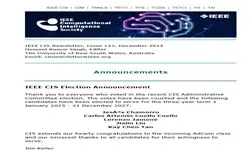KEYNOTE: Fuzzy Systems to Support Safe and Trustworthy Artificial Intelligence
Francisco Herrera, University of Granada,, Granada, SPAIN
-
Members: FreeCIS
IEEE Members: Free
Non-members: FreeLength: 01:07:00
02 Jul 2024
Francisco Herrera, University of Granada, Granada, SPAIN
ABSTRACT: "Artificial Intelligence (AI) has matured as a technology, AI has quietly entered our lives, and it has taken a giant leap in the last year. Image generative AI models or the latest evolutions of large language models have meant that AI has gone, in just a few
months, practically from science fiction to being an essential part of the daily lives of hundreds of millions of people around the world.
This emergence goes hand in hand with a growing global debate on the ethical dimension of AI which raises the need for responsible, fair, inclusive, trustworthy, safe, transparent and accountable frameworks. Two essential concepts emerge in this scenario. 1) Trustworthy AI, supported on the legal, ethical, and technical robustness pillars, including seven technical requirements. 2) AI safety, which encompass machine ethics and AI alignment, aiming to make AI systems moral and beneficial, and robustness technical problems (including monitoring systems for risks, robustness against adversaries, detecting malicious use, attacks and backdoors, …) Safe and trustworthy AI is a critical area to meet upcoming regulations, the necessary
auditability metrics for their analysis and compliance, address ethical issues, manage risk analysis in human-AI system interaction, and ensure the technical soundness of responsible AI systems (auditability and accountability during its design, development
and use). This talk addresses the role that fuzzy systems can play in supporting the technical requirements of safe and trustworthy AI. The use of fuzzy sets and systems can support auditability and accountability metrics, to address different technical requirements for trustworthy (explainability, privacy and federated learning, fairness, ...), and to design fuzzy monitoring systems for robustness, ... Finally, we should delve into another essential aspect, discuss and think about the
development of fuzzy technologies that fit into the design requirements for auditability and design frameworks for accountable AI systems. This is a great opportunity to explore in today's emerging safe and trustworthy AI scenario.
"


